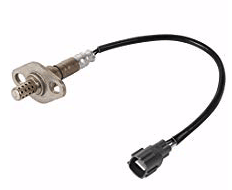P0130 is a very common OBDII code that occurs in the Toyota Camry. It is typically caused when the Oxygen Sensor voltage is not within normal operating conditions.
Toyota Camry P0130 Symptoms
Typically, the only symptom of P0130 is going to be the service engine soon light. In some cases, there can be other symptoms as well. These symptoms include:
- Rough running engine
- Smelly exhaust
- Service light on
- Poor MPG
Most of the time, it’s not a breakdown risk. But, like anything that causes the service engine soon light to come on it is a good idea to have it fixed as soon as possible.
P0130 Causes: Toyota Camry
Here are the most common issues that cause the P0130 code in the Toyota Camry. They are presented in order (somewhat) of most to least likely to cause the problem.

- Bad Oxygen Sensor– The oxygen sensor itself is one of the most likely reasons that P0130 is triggering your service engine soon light. Although it is a temptation to replace it right away, it wouldn’t hurt to check out the wiring harness around it beforehand. See directly below. They are relatively affordable at Autozone or Amazon.
- Wiring Harness Damage– The wiring that goes to the front and rear oxygen sensors is very susceptible to damage. This is due to the fact that O2 sensors are under the chassis where they are subject to punishment from road debris, and they are subjected to a lot of exhaust heat. The downstream sensor is especially susceptible to this problem Here’s how to find a short in the wiring harness (Youtube)
- Damage to the Terminal– The terminal that the oxygen sensor connects to (the plug) is also relatively susceptible to damage. You’ll want to make sure that there is voltage going to it. There’s more on that directly below.
- Blown Heater Sensor Circuit Fuse– Here’s how to test if a fuse is blown (Youtube).
- Exhaust Leak– If the exhaust is leaking, then it’ll allow oxygen in that shouldn’t be there. That can throw this code.
- Wrong O2 Sensor– If you are getting P0130 after having recently replaced your Oxygen sensor, it may be that the replacement is wrong or bad.
Camry P0130 Diagnosis
Here is a fantastic video that covers all aspects of diagnosing a P0130 trouble code It’s for a VW, but the code is universal.
It is possible to diagnose the P0130 with a multimeter. If you use the multimeter, you’ll know whether or not the voltage coming to and from the oxygen sensor is within spec, this can help you determine if it’s your Camry’s O2 sensor, or wiring harness that’s the issue.
If you don’t have access to a multimeter, it certainly wouldn’t hurt to check the wiring to between the fuse box and the Oxygen sensor first. If it ends up being a wiring issue, it’ll save you money over buying an unnecessary O2 sensor.
You can also use a voltage test light to determine whether or not the oxygen sensor is getting any voltage at all (they’re about $5 at Walmart). If it’s not getting any voltage, attach the test light to the harness plug and shake the wiring a little bit. If the light comes on, even for a second, you know that you have a short circuit causing the P0130 trouble code.
Conclusion
Most of the time with P0130, it’s going to be the oxygen sensor itself that has caused the code to trigger. Good luck finding whatever caused it in your Toyota Camry. If you have anything that you would like to add, please feel free to leave a comment below.

